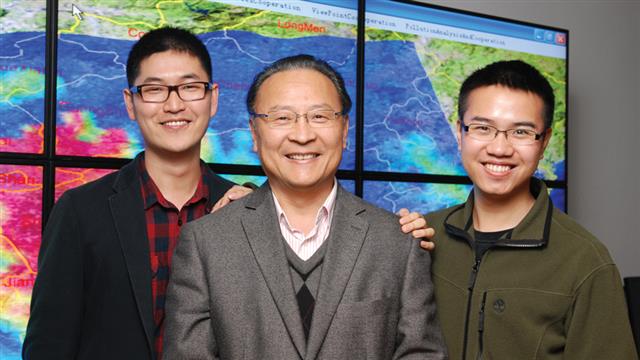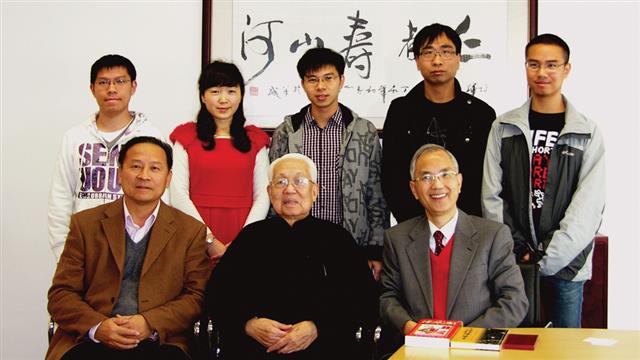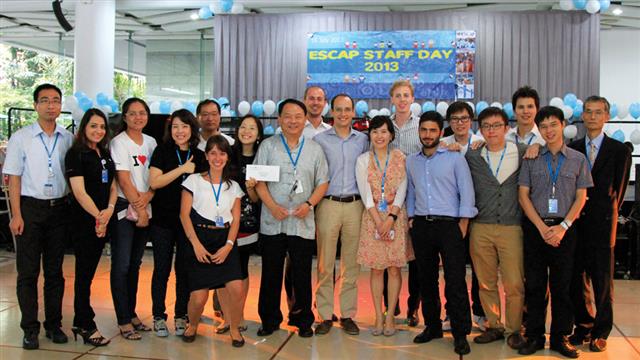'Internship experience' has become an integral part of a university graduate's curriculum vitae. Everyone wants to be able to enter a prestigious international organization. 'Big Four' auditing firms are a magnet for accounting students; Goldman Sachs and Merrill Lynch are the first choices of finance students; Fine Art majors want to work for the Louvre and Christie's. But there is a truly international organization which is too often overlooked—the United Nations (UN). Over the past two years, a dozen or so of our students have been lucky enough to land internships at UN agencies.
An Invitation
Due to climate change, natural disasters are happening at an increasingly high rate around the world. The Asia-Pacific region, from time to time subject to storms, earthquakes, and tsunamis, is the most disaster-prone region. Many countries in Asia lack the resources and technology to protect themselves against disasters or to minimize damage caused. Therefore disasters often entail huge human and economic losses. According to UN statistics, natural disasters in the Asia Pacific affected more than 57 million people and caused US$128 billion in damages in 2013 alone. The region is in dire need of support from the international community.
The UN Economic and Social Commission for Asia and the Pacific (ESCAP), established in 1947, is the largest regional development arm of the UN for the Asia-Pacific region, and is now actively managing related resources from member countries and regions to enhance the capacity of early disaster warning of developing countries. Prof. Lin Hui, director of the Institute of Space and Earth Information Science (ISEIS), pointed out that in 2001, ISEIS became Hong Kong's non-governmental contact point of ESCAP's Satellite Remote Sensing, GIS and Satellite Navigation Working Group. The institute helps UN members by training personnel in the use of advanced satellite remote sensing and GIS technologies and building disaster reduction infrastructure. After years of observation, ESCAP officials thought the institute's students had acquired comprehensive knowledge of Earth System Science and Earth Information Science and were able to assist the ESCAP headquarters in Bangkok to set up a database and software facilities to improve the efficiency of disaster prevention and relief. The institute recommended their students for its consideration.
UN internship programmes generally do not provide salaries and subsidies. Fortunately, Hong Kong Shun Lung Yan Chak Foundation was generous enough to sponsor the students' air fares and living expenses. Professor Lin said it was because he met Mr. Lau Sai-yung at a meeting at Wu Yee Sun College. 'Mr. Lau is a member of the foundation. He told the chairman Mr. Choi Park-lai that a meaningful internship programme needed funding. Mr. Choi paid a visit to ISEIS and promised to sponsor the programme. I was relieved. Mr. Choi has also promised to sponsor our 2015 programme.'
Putting Knowledge into Practice
In 2013, eight postgraduate students from ISEIS completed their internship. They were responsible for disaster reduction infrastructure establishment, collection and analysis of regional disaster information, as well as administrative work for various meetings held in ESCAP. In 2014 seven more postgraduate students completed the internship. Lin Tianpeng, a student on the 2013 programme, said, 'I was assigned to the Information and Communications Technology and Disaster Risk Reduction Division (IDD) to help monitor the development of cyclones and earthquakes.' Although IDD is an important agency for disaster prevention in the Asia-Pacific region, the technology it employed was still relatively backward. 'Staff working there had different academic backgrounds and were not familiar with advanced technology in earth information. They used office softwares like Excel, PowerPoint, etc., some sort of digital table and text-based database, which are definitely inadequate for assessing the geographic impact of disasters.' Tianpeng specialized in Virtual Geographic Environments. He helped to download and install free GIS software and used it to turn IDD's data into vivid images, greatly improving the efficiency of observation and the response time for disaster control.
Another student Zhang Fan who specialized in Virtual Geographic Environments, found that the problems of manpower and technology were present in other ESCAP divisions. 'The Statistics Division would like to demonstrate the population distribution of the Asia-Pacific region by GIS but its staff were not familiar with software application, so three ISEIS students including me helped them. I also helped the Transport Division to analyse the road networks of two underdeveloped regions and find out the relationship between road networks and natural disasters.' The work of the ISEIS students and their positive and responsible attitudes were highly appreciated by the UN officers.
A Promising Future
Most ISEIS graduates work in the government and private sectors, or pursue graduate studies. The internship programme allows the students to have a better understanding of the work of the UN. This opens up possibilities for working for international organizations. Lin Tianpeng and Zhang Fan both agreed that the programme tested their learning outcomes and broadened their minds. It also provided valuable exposure to different cultures.
Professor Lin emphasized that students of the Chinese University have good English communication skills and they are open-minded. They also participate in frontier research projects of ISEIS, which gives them a competitive edge in the global workplace.
ISEIS is going to celebrate its 10th anniversary this year. Professor Lin said that ESCAP has just sent a letter to Vice-Chancellor Prof. Joseph J.Y. Sung, to thank ISEIS students' contributions and to request the institute to send more students to its headquarters. The institute replied that they are going to have their third internship programme. As ESCAP requested, the duration of the internship will be extended, but due to limited budget, the number of students sent will be reduced. The UN also suggested that ISEIS offer training at CUHK and invite people from other countries to come. Many countries realize that it is better to nurture their own expertise in advanced technology and build up an expertise network than to only seek material assistance. 'CUHK is a good place to set up a UN international training centre due to Hong Kong's geographical location, advanced level of internationalization, and the research ability and learning environment of ISEIS. We are planning to solicit donations from the community to realize our vision. We hope this goal will be achieved in the near future,' Professor Lin remarked.




